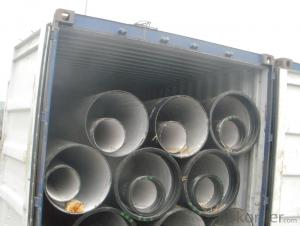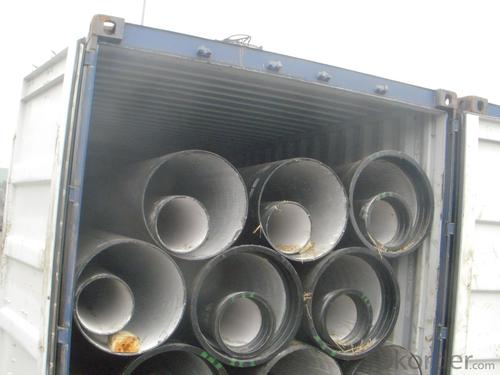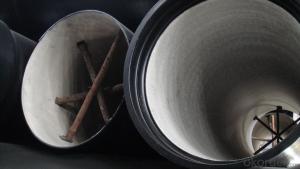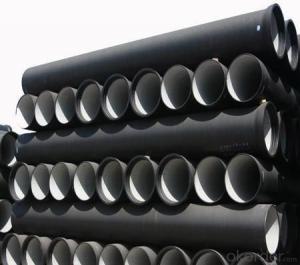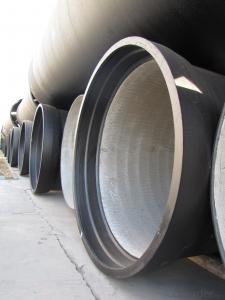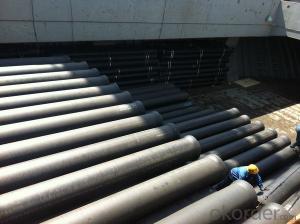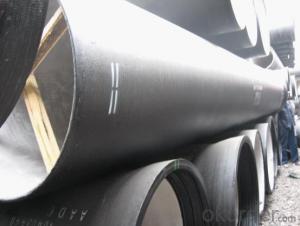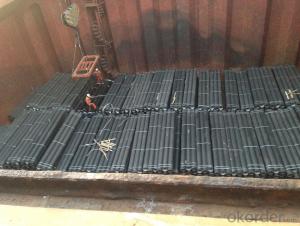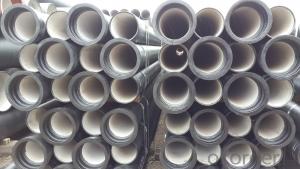T Type Ductile Iron Pipe K CLASS DN1600 socket spigot pipe
- Loading Port:
- Tianjin
- Payment Terms:
- TT OR LC
- Min Order Qty:
- 25 m
- Supply Capability:
- 30000 m/month
OKorder Service Pledge
OKorder Financial Service
You Might Also Like
1) The standard of pipe: ISO2531:1998, EN545:2006,K9 K8
2) Effective length: 6m/5.7m
3) Inner cement line: Portland cement lineas per ISO4179
4) Zinc coating: at least 130g/m2 as per ISO8179
5) Bitumen painting: at least 70μm as per ISO8179
6)With 102% quantity of NBR, SBR, or EPDM ring asper ISO4633
7) DN80-DN1200
8) Highstrength, lighter than grey iron, good corrosion resistance, no furring, smallflow resistance, easy fixing, long life tome about 100 yeas
9)Checked by automatic inspection equipment
10) Composition:
Chemical composition | |||
Chemical composition | Ductile Cast Iron Pipe (%) | Grey iron pipe (%) | Steel pipe (%) |
C | 3.5-4.0 | 3.2-3.8 | 0.1-0.2 |
Si | 1.9-2.6 | 1.4-2.2 | 0.15-0.4 |
Mn | 0.15-0.45 | 0.4-0.6 | 0.3-0.6 |
P | ≤0.06 | ≤0.3 | 0.02-0.03 |
S | ≤0.02 | ≤0.1 | 0.02-0.03 |
Mg | 0.03-0.06 |
|
|
11) Feature:
Mechanical properties | |||
| Ductile Cast Iron Pipe | Grey Iron Pipe | Steel Pipe |
Tensile Strength(Mpa) | ≥420 | 150-260 | ≥400 |
Yield Strength(Mpa) | ≥300 | No Confirmation | No Confirmation |
Bending Strength(Mpa) | ≥590 | 200-360 | ≥400 |
Elongation (%) | ≥10 | Neglected | ≥18 |
Brinell Hardness(HBS) | ≤230 | ≤230 | About 140 |
12) T type mechanical joint
13) Packing: in bulk or container
PACKING: 1) Pipesare bundled together with the steel belt.
2) Wooden pieces are put between the pipes.
- Q: Can ductile iron pipes be used for mining applications?
- Yes, ductile iron pipes can be used for mining applications. Ductile iron pipes are known for their strength, durability, and resistance to corrosion, making them suitable for various industrial purposes, including mining. Their ability to withstand high pressure and handle heavy loads makes them ideal for transporting water, slurry, and other materials commonly used in mining operations. Additionally, ductile iron pipes have a long lifespan, reducing the need for frequent replacements and maintenance in mining environments.
- Q: Can ductile iron pipes be used for irrigation systems in saline soil conditions?
- Yes, ductile iron pipes can be used for irrigation systems in saline soil conditions. Ductile iron pipes are known for their durability and corrosion resistance, making them suitable for various soil conditions, including saline soil. Saline soil contains high levels of salt, which can cause corrosion and deterioration of certain materials. However, ductile iron pipes have a protective coating, such as cement mortar lining or polyethylene encasement, which provides an additional layer of protection against corrosion. This ensures that the pipes can withstand the corrosive effects of saline soil and maintain their structural integrity over a long period of time. Additionally, ductile iron pipes have a high tensile strength, making them resistant to cracks and breaks, which is important for irrigation systems that require a continuous and reliable water supply. Therefore, ductile iron pipes are a suitable choice for irrigation systems in saline soil conditions.
- Q: Can ductile iron pipes be used for seawater intake systems?
- Seawater intake systems can utilize ductile iron pipes, which are a type of cast iron renowned for their strength, durability, and corrosion resistance. These properties render them suitable for various applications, including seawater intake systems. The high salt content of seawater makes it highly corrosive, posing a threat to regular cast iron pipes that may suffer from corrosion and damage over time. However, ductile iron pipes possess a protective coating acting as a corrosion barrier, enabling them to endure the harsh conditions of seawater. Furthermore, compared to regular cast iron pipes, ductile iron pipes exhibit superior tensile strength, enhancing their resistance to the intense pressures and stresses associated with seawater intake systems. As a result, ductile iron pipes offer a dependable and cost-effective option for seawater intake systems.
- Q: Does the cast iron pipe for spheroidal graphite need corrosion protection when laying underground?
- In quality, the spheroidization of cast iron pipes is controlled to be 1-3 (spheroidization rate 80%), so the mechanical properties of the cast iron pipes, ductile iron pipes and finished product libraries can be better improved, with the nature of iron and the properties of steel
- Q: What are the different coating thickness options for ductile iron pipe?
- The coating thickness options available for ductile iron pipe can vary depending on the specific application and requirements. Typically, there are three commonly used coating thickness options for ductile iron pipe: 1. Standard Thickness: Normally, the coating thickness for ductile iron pipe falls within the range of 200 to 250 microns (8-10 mils). This thickness is generally sufficient to protect against corrosion and abrasion in most soil and water conditions. 2. Increased Thickness: In certain cases, when the pipe is exposed to more aggressive environments or requires a longer lifespan, it may be necessary to use a thicker coating. This can range from 300 to 500 microns (12-20 mils) or even more, depending on the specific requirements. 3. Specialized Coatings: For particularly demanding applications, specialized coatings may be utilized. These coatings offer even greater protection against corrosion, abrasion, or chemical exposure. The thickness of these specialized coatings can vary significantly depending on the specific coating material and application requirements. It is important to emphasize that the selection of coating thickness should be based on a comprehensive evaluation of the environmental conditions, intended lifespan, and any relevant industry standards or specifications. It is advisable to consult with a coating manufacturer or corrosion specialist to determine the appropriate coating thickness for a specific ductile iron pipe application.
- Q: DN300 what's the price of the ductile iron pipe / the weight and the price of one meter?
- Graphite is exist in spherical form, usually graphite size is 6-7, casting spheroidization grade control requirements for 1-3 quality (spheroidization rate greater than 80%), so the mechanical properties of the material itself has been improved, has the essence of iron, steel performance.
- Q: Are ductile iron pipes resistant to chloride-induced corrosion?
- Yes, ductile iron pipes are generally resistant to chloride-induced corrosion due to their protective coating and inherent chemical composition. However, the level of resistance may vary depending on the specific environment and concentration of chlorides present. Proper maintenance and regular inspections are still important to ensure long-term durability and prevent any potential corrosion issues.
- Q: How are ductile iron pipes protected against root intrusion?
- Ductile iron pipes are protected against root intrusion through the use of protective coatings and barriers. One common method is to apply an external coating, such as a bituminous or epoxy layer, which acts as a deterrent for root penetration. Additionally, root barriers made of high-density polyethylene or other materials can be installed around the pipes to further prevent root intrusion. These measures help to maintain the structural integrity of the pipes and prevent any potential damage caused by root growth.
- Q: Can ductile iron pipes be used for water treatment plants?
- Yes, ductile iron pipes can be used for water treatment plants. Ductile iron pipes have excellent corrosion resistance and durability, making them suitable for transporting water in water treatment plants. Additionally, their high tensile strength allows them to withstand the high pressures often found in these facilities.
- Q: How much pressure can the ductile iron pipe socket meet?
- After all, he is not steel, strength is low, toughness is poor. But a short period of about 100kg, things should be no problem.
Send your message to us
T Type Ductile Iron Pipe K CLASS DN1600 socket spigot pipe
- Loading Port:
- Tianjin
- Payment Terms:
- TT OR LC
- Min Order Qty:
- 25 m
- Supply Capability:
- 30000 m/month
OKorder Service Pledge
OKorder Financial Service
Similar products
Hot products
Hot Searches
Related keywords
